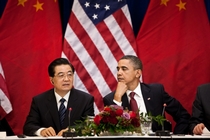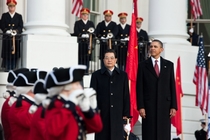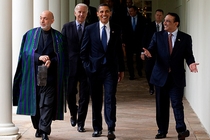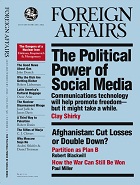Arm Sales for India
With India planning to buy $100 billion worth of new weapons over the next ten years, arms sales may be the best way to revive Washington's relationship with New Delhi, its most important strategic partner in the region.
 Courtesy:
Courtesy:
With India planning to buy $100 billion worth of new weapons over the next ten years, arms sales may be the best way to revive Washington's relationship with New Delhi, its most important strategic partner in the region.
 Courtesy: CrethiPlethi/Flickr
Courtesy: CrethiPlethi/Flickr
As the Arab world reinvents itself in real time, the rest of the world must begin to understand the region as something more than a source for oil and a market for armaments and consumer goods.
In the last few months, South Asia has gone from being just a global security headache, to a region with new possibilities. Teresita C. Schaffer, former US ambassador to Sri Lanka, and Howard Schaffer, former US ambassador to Pakistan and Bangladesh, discuss the major challenges that confront the US in South Asia.
 Courtesy: NinaAldinThune/Wikimedia
Courtesy: NinaAldinThune/Wikimedia
There are more than Western interests at play in Egypt. The other catalysts for the unrest are a combination of Iranian adventures, hypocritical policies of West Asian regimes and resurgent commodity speculation in western markets, triggering a rise in prices of basic items in emerging markets
 Courtesy: SamanthaAppleton/WhiteHouse
Courtesy: SamanthaAppleton/WhiteHouse
Indo-US business dealings and the US Federal Reserve’s money-printing initiative may have saved Chinese President Hu Jintao the headache of explaining – to his American counterpart – China’s stealth fighter shocker, undervalued currency and giant trade surplus.
 Courtesy: ChuckKennedy/WhiteHouse
Courtesy: ChuckKennedy/WhiteHouse
Chinese President Hu Jintao’s visit to the US comes at a time when the geopolitical situation in Asia and the Asia-Pacific region is fluid - consequent to the US deciding to re-energise relations with countries in the region - and when Sino-US relations have been under some strain.
 Courtesy: PeteSouza/WhiteHouse
Courtesy: PeteSouza/WhiteHouse
A week after Salman Taseer's murder, US Vice President Joseph Biden flew to Pakistan to "gauge priorities" in the Af-Pak region. India, Ambassador Neelam Deo says, must not allow itself to become a victim of American imperatives and Pakistani maneuvers.

The exodus of talented Chinese, Indians and Europeans to the United States has depleted these countries of their brightest minds. Who can blame them when a bunch of archaic educational guidelines impede the expansion of educational institutions and thus the benefits from opportunity?
 Courtesy:
Courtesy:
There are no easy or cost-free ways to escape the current quagmire in Afghanistan. Although it has problems, a de facto partition of Afghanistan, in which Washington pursues nation building in the north and counter terrorism in the south, offers an acceptable fallback.
 Courtesy: Mike Russia/Wikipedia
Courtesy: Mike Russia/Wikipedia
Although freeing Aung Suu Kyi may allow Burma’s military leaders to escape scrutiny for now, their budding nuclear ambitions could rejuvenate international interest in placing pressure on their regime.